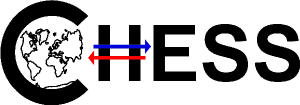The CHESS Lagrangian modelling course took place at the University of Bergen from 07th to 10th of June 2022. PhD students and early career researchers working in the fields of oceanography, environmental and atmospheric sciences from Tromsø, Oslo and Bergen participated in the course. Lecturers from University of Oslo, University of Bergen, ETH Zurich and Norwegian Institute for air research provided students with theoretical knowledge and practical skills in Lagrangian analyses applied in natural sciences. There were discussions about differences and similarities of atmospheric and oceanographic Lagrangian models, tracer experiments and model uncertainties. A special focus has been set on the application of Lagrangian methods in climate studies, such as water vapour and air mass tracing and mesoscale ocean flow and eddy simulations used to investigate transport of heat in the ocean and atmosphere. Besides, practical applications of Lagrangian modelling for marine search and rescue operations, oil spill accidents and air pollution studies have been introduced, and students practised on setting up HYSPLIT, Opendrift and FLEXPART model runs for specific case studies. At the last day of the course, students presented how they use Lagrangian modelling in their own research to simulate potential oil spills, sea lice spreading and radioactive emissions from a major nuclear power plant accident.
Overall, the course provided an excellent opportunity to obtain interdisciplinary knowledge in Lagrangian methods in observations and modelling and to broaden their network for early career scientists from different parts of Norway.
Text: Alena Dekhtyareva

